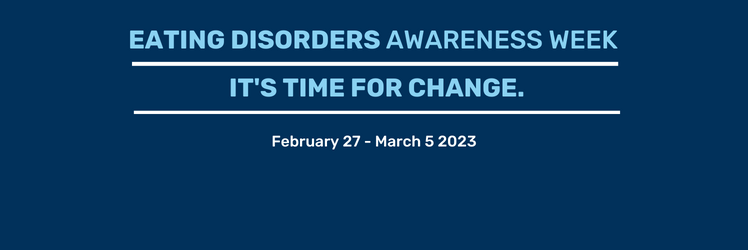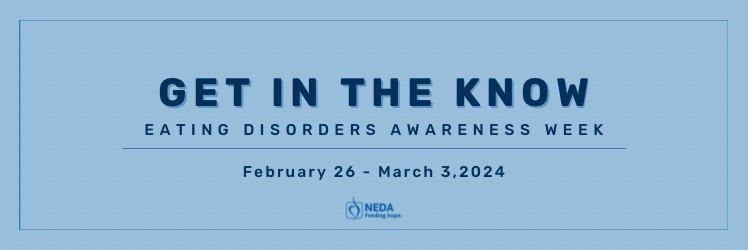Eating Disorders Awareness Week (EDAW) was launched in Columbus, Ohio in 1984 by the National Anorexic Aid Society to coincide with our 3rd National Eating Disorder Conference. Our first theme was “Be the person you are; It’s what’s inside that counts”. Our goal was to educate health and mental health professionals, schools, colleges and the public about the signs and symptoms of eating disorders, and provide treatment resources for affected individuals and families. The next two years focused on expanding EDAW to the entire state of Ohio.
In 1987, a plan for a National Eating Disorder Awareness Week (now EDAW) was developed and launched. In 2001, the National Eating Disorders Association & Prevention organization and the American Anorexia Bulimia Association merged to form the National Eating Disorders Association (NEDA). At the time, Eating Disorders Awareness & Prevention and the American Anorexia Bulimia Association were “the largest and longest standing eating disorders prevention and advocacy organizations in the world.” EDAW was adopted as the ongoing annual project and has evolved into a significant national event (there are other activities taking place during a different week in other parts of the world).
This Eating Disorders Awareness Week (EDAW), we celebrate Strength through Experience and Knowledge by recognizing that It’s Time for Change alongside other mission aligned organizations. As the chair of NEDA’s Clinical Advisory Council, I’d like to share with you some thoughts and perspectives from our Clinical Advisors as well as what the focus should be on in our field.
Kim Dennis, MD, CEDS emphasizes the need to highlight the experience of the underrepresented communities. Kim says “This year for EDAW, I contemplate what it would be like to amplify the voices of people whose experience with an eating disorder doesn’t fit nicely into one DSM V category, or maybe doesn’t fit into any current DSM V category at all. The people we are missing. The people from black, brown and indigenous communities who are underrepresented in eating disorder clinics and research studies. The people who have food addiction, who are told that doesn’t exist and pathologized for believing it does. The people who don’t get well or fully well with our current methods of diagnosis and treatment. What a change it would be if we could all stand together, shoulder to shoulder, to support each other with kindness and compassion whatever our struggle has looked like or does look like.”
Paula Edwards-Gayfield, MA, LCMHCS, LPC, NCC, CEDS-S has a message for professionals. “My hope is that “It’s Time for a Change” is heard by Black, Indigenous and People of Color (BIPOC), and professionals. BIPOC individuals need eating disorder support. It’s more than a love/hate relationship with food or a lack of discipline. BIPOC individuals may rationalize their struggle with food, body, shape/weight because they are not White or don’t “look Anorexic”. What does an eating disorder look like? Look around! Professionals, listen to your BIPOC clients, they are trusting you.” Douglas Bunnell, Ph.D, FAED, CEDS adds “When we think about what it takes to fully recover from an eating disorder we have to listen very carefully to what people with ED and their families say. The power of their connections with the people in their lives often vastly exceeds the power of even intensive treatment but we often forget that. Clinicians need to go out of their way to understand who is in their patient’s life, who is there to support, who needs to help to understand and who may be suffering along with their patient.” Riley Nickols, PhD, CEDS, who is a counseling and sport psychologist, adds that experts from various disciplines need to work together to fully support these individuals. “Treatment for an athlete suffering from an eating disorder is optimized when multidisciplinary treatment providers have specific training, experience, and demonstrated expertise working both with the athlete and eating disorder populations,” says Riley.
We know that eating disorders don’t discriminate and affect people of all genders, ages, races, religions, ethnicities, sexual orientations, body shapes, and weights. “As we are learning more about the nuances and variability in the experiences of struggling with eating disorders, there is an essential conversation to be had recognizing our current limitations, especially about eating disorders in BIPOC, LGBTQIA+ and other marginalized communities. We need to advocate for, value and center those folx struggling with eating disorders who also have lived experiences of discrimination, bigotry and being othered to be able to provide just, equitable care,” says Norman Kim, PhD.
When we talk about eating disorders, we also need to talk about the diet culture that we are all exposed to. “Eating Disorders are serious, impactful illnesses that have many influences including our dieting culture. The diet culture is now mainstream such that nutrition has become conflated with rigid, restrictive, rule-bound eating patterns that do not support health or living life to its fullest. We forget that nourishment includes feeding the body and more. It is time for change. Breaking bread with others can be a source of connection, support, adventure and pleasure in addition to meeting the body’s need for nourishment. I hope for change to a culture that embraces a broader definition of health and nutrition, one that is less rigid and more inclusive, supporting all persons, those with and without eating disorders of all cultures, creeds, genders, ages, shapes and sizes,” says Leah Graves,RDN, LDN, CEDS-S, FAED .
The lived experience of an eating disorder is unique to the person. “We want change, when we want to be different, to improve, and grow. A person’s life experience is impacted by their unique environment and internal process. In the uniqueness and individuality we find resiliency, strength, and growth. Race, ethnicity, culture, life experiences, environment, and access should always be considered when treating Eating Disorders. Treatment needs to be ready to change, adapt, and be flexible to promote healing,” says Rocio Avila, LCSW.
Please join us this Eating Disorders Awareness Week to hear from those with lived experiences, to learn about ways to initiate conversations around eating disorders, and to spread awareness in your communities!
Amy Baker Dennis, Ph.D., FAED, FACT, is a clinical and research psychologist. She has maintained a clinical practice for over 45 years and has specialized in the treatment of eating disorders since 1977. She is a Founding Fellow of the Academy for Eating Disorders (AED), Founding member of the Eating Disorder Research Society (EDRS), Founding member of the National Eating Disorder Association (NEDA), Founding Fellow/Diplomate of the Academy of Cognitive Therapy (ACT) and a Certified Cognitive Therapist. She currently serves as the chair of the NEDA’s Clinical Advisory Council.





